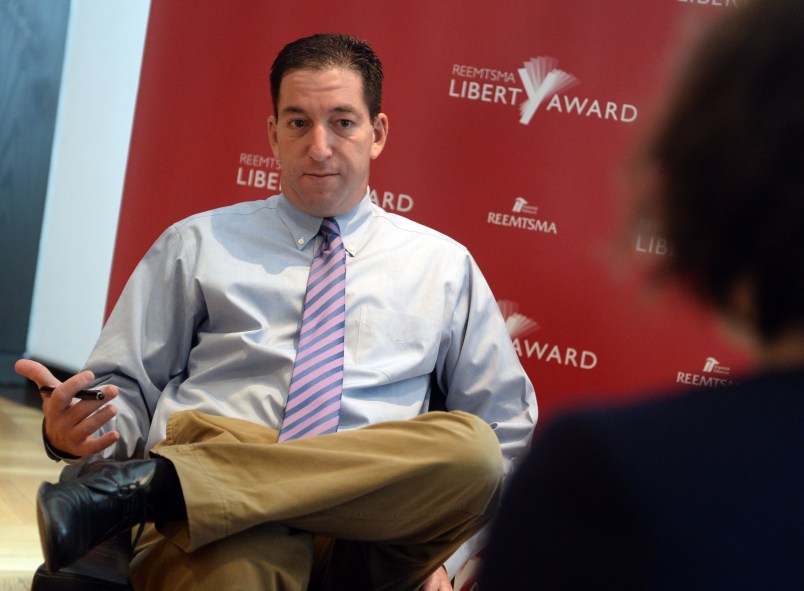Glenn Greenwald wasn’t about to let Michael Kinsley’s harsh book review go unchallenged. But even as he ripped Kinsley for suggesting that reporting on the National Security Agency surveillance programs could justify prosecution, Greenwald believes the review substantiates a point he’s made repeatedly.
In a lengthy, block quote-heavy post on The Intercept on Friday, the digital magazine for which he currently works, Greenwald took aim at both Kinsley and New York Times Book Review editor Pamela Paul for publishing the review.
Greenwald highlighted a 2006 piece in which Kinsley criticized the Boston Globe for revealing the Bush administration’s extra-legal use of “signing statements.” Writing for the Washington Post at the time, Kinsley decried “the ongoing issue of leaks and anonymous sources” and argued that journalists shouldn’t publish information that the government wishes to remain a secret.
“This is the person whom Pamela Paul, editor of The New York Times Book Review, chose to review my book, No Place to Hide, about the NSA reporting we’ve done and the leaks of Edward Snowden: someone who has expressly suggested that journalists should be treated as criminals for publishing information the government does not want published,” Greenwald wrote.
Indeed, given his track record, Kinsley’s take on Greenwald and the Snowden disclosures probably could have been anticipated.
In the review that was published by the Times on Thursday, Kinsley wrote that Greenwald shouldn’t get to decide what classified information gets published and what doesn’t. Moreover, Kinsley even went as far to suggest that “perpetrators” like Greenwald might deserve to be locked up.
Greenwald wrote that many of the critics who generally liked his book still “took grave offense to its last chapter, which argues that the U.S. media is too close and subservient to the U.S. government and its officials, over whom the press claims to exercise adversarial oversight.”
But Greenwald believes Kinsley proved his point.
“Do I need to continue to participate in the debate over whether many U.S. journalists are pitifully obeisant to the U.S. government? Did they not just resolve that debate for me?” Greenwald wrote. “What better evidence can that argument find than multiple influential American journalists standing up and cheering while a fellow journalist is given space in The New York Times to argue that those who publish information against the government’s wishes are not only acting immorally but criminally?”
Kinsley also used the review to defend “Meet the Press” moderator David Gregory, who posed an accusatory question to Greenwald last summer.
“To the extent that you have aided and abetted Snowden, even in his current movements, why shouldn’t you, Mr. Greenwald, be charged with a crime?” Gregory asked.
Gregory was subsequently raked over the coals, but Kinsley wrote that it was a legitimate question because Greenwald “does not deny that he has ‘aided and abetted Snowden.'”
Greenwald has in fact denied that he ever “aided and abetted Snowden,” as the Washington Post’s Erik Wemple pointed out.
Wemple asked Paul what Kinsley meant by that observation.
“According our interpretation of Kinsley, what Greenwald does is shift the definition of ‘aiding and abetting’ so as to be part of the standard practice of investigative journalism,” Paul said. “Per Kinsley, what Greenwald actually did met the definition of ‘aiding and abetting Snowden.’ This is Kinsey’s opinion, as reflected in his review.”







Who is this Glenn Greenwald guy, and why am I supposed to care?
What has he done? Why is his opinion important?
[Kinsley] argued that journalists shouldn’t publish information that the government wishes to remain a secret.
Really? He seriously argued this? Is he in his right mind?
The self serving Greenwald. It wasn’t hard to anticipate his position either.
Waaah, they didn’t assign a friendly reviewer!
He won’t let his work be edited. He considers it out of bounds if his writing is reviewed by someone with the wrong beliefs.
Gimme a break.
Over his (career) Glen Gadfly (all wallets are green) as a victim, as a saint (and former champion of Bush) now excoriating the ‘man’ (packing sausage made from an illegal data breach) has as his newest foil a twit joust with Kinsley.
The episode belies that both depend on media for sustenance.
Hardly journalism, the new white meat.